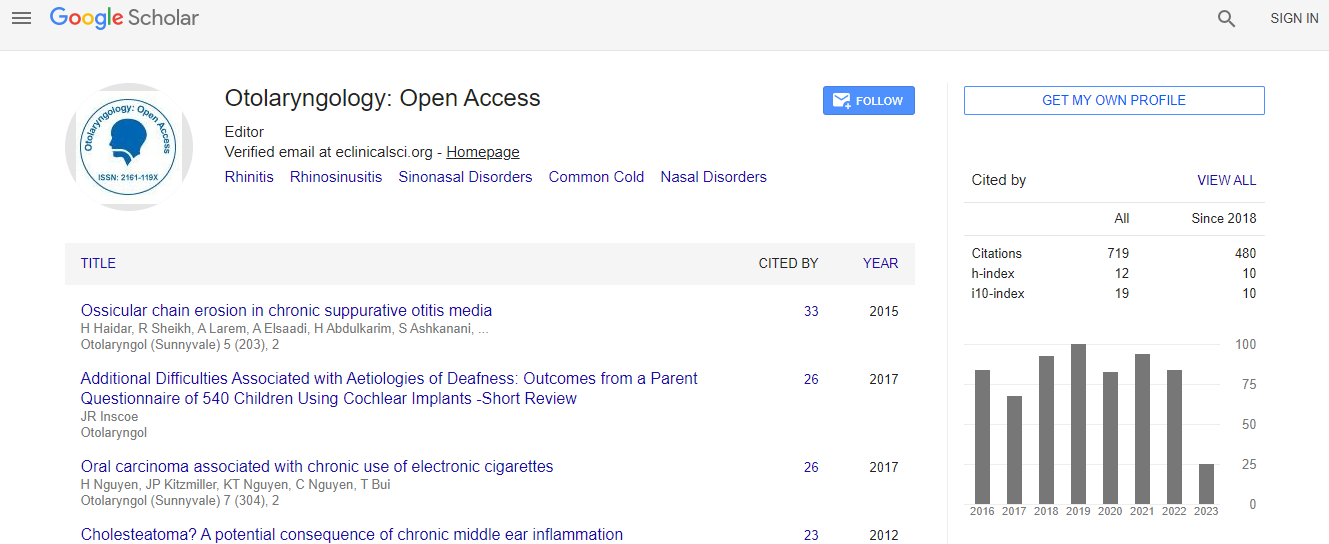Our Group organises 3000+ Global Conferenceseries Events every year across USA, Europe & Asia with support from 1000 more scientific Societies and Publishes 700+ Open Access Journals which contains over 50000 eminent personalities, reputed scientists as editorial board members.
Open Access Journals gaining more Readers and Citations
700 Journals and 15,000,000 Readers Each Journal is getting 25,000+ Readers
Google Scholar citation report
Citations : 925
Otolaryngology: Open Access received 925 citations as per Google Scholar report
Otolaryngology: Open Access peer review process verified at publons
Indexed In
- Index Copernicus
- Google Scholar
- Sherpa Romeo
- Open J Gate
- Genamics JournalSeek
- RefSeek
- Hamdard University
- EBSCO A-Z
- OCLC- WorldCat
- Publons
- Geneva Foundation for Medical Education and Research
- ICMJE
Useful Links
Recommended Journals
Related Subjects
Share This Page
Vocal assessment in patients with unilateral vocal cord paralysis pre and post vocal rehabilitation and their outcomes
3rd International Conference and Exhibition on Rhinology & Otology
Tania Constantino
CUF Infante Santo Hospital, Portugal
Posters & Accepted Abstracts: Otolaryngology
Abstract
Introduction: The aim of this study is to analyze objectively and subjectively voice quality in patients with unilateral vocal cord paralysis in pre and post vocal rehabilitation phase. Methods: A retrospective study through vocal analysis of 18 patients, 4 male and 14 female, mean age 50 years, evaluated by an otolaryngologist Voice consultation and diagnosis of unilateral paralysis of the vocal cord adduction. In the acoustic analysis, we used the software Dr. Speech, through the issue of sustained vowels / a /, / i / and / e / the F0 parameters were analyzed, SD F0, Jitter, Shimmer, Tremor, NNE and HNR. Audio-perceptive analysis was assessed by GRBAS and only analyzed dysphonia as the degree of severity (G) sustained vowel / a /, / i / and / and / and conversation. The maximum phonation time is obtained by an average of 3 issues of the vowels / a / and / i /. Patients began speech therapy, with one session per week and were reassessed after 12-15 sessions. A descriptive statistical analysis and inference testing was done. Results/Discussion: In the acoustic analysis found significant results in some of the vocal parameters, as well as the degree of dysphonia and maximum phonation time. Conclusions: Vocal rehabilitation and treatment of patients with unilateral vocal cord paralysis proves to be effective in lowering dysphonia, promoting improved acoustics, audio-perceptive and maximum phonation time. In the future it is considered important to a multidisciplinary approach, since laryngoplasty injection, the use of cutaneous electrostimulation associated with conventional voice therapy.Biography
Email: taniairc@gmail.com

 Spanish
Spanish  Chinese
Chinese  Russian
Russian  German
German  French
French  Japanese
Japanese  Portuguese
Portuguese  Hindi
Hindi 
